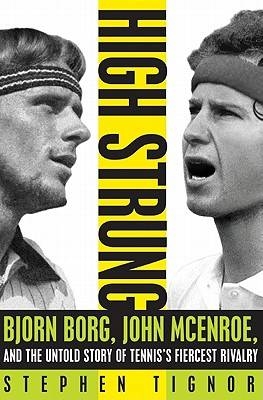
High Strung
John McEnroe, Bjorn Borg, and the Untold Story of Tennis's Fiercest Rivalry
Seiten
2011
Harper (Verlag)
978-0-06-200984-5 (ISBN)
Harper (Verlag)
978-0-06-200984-5 (ISBN)
- Titel ist leider vergriffen;
keine Neuauflage - Artikel merken
For all the upsets, unexpected career turnarounds, and bizarre instances of violence tennis has produced, there have been few moments stunning to fans than the one that occurred immediately after the men's final at the 1981 US Open. This title explores the lives and careers of the four players who defined the era.
For all the upsets, unexpected career turnarounds, and bizarre instances of violence tennis has produced, there have been few moments more stunning to fans than the one that occurred immediately after the men's final at the 1981 U.S. Open. Bjorn Borg, the stoical Swede who had been the game's most respected gentleman and resolute competitor for the better part of a decade, lost to his younger and brash rival John McEnroe and walked straight out of Louis Armstrong Stadium at Flushing Meadows, an unsightly breach in decorum. Borg's career had suddenly ended, and so had the era of tennis that he and the three other semifinalists at that year's Open-McEnroe, Jimmy Connors, and Vitas Gerulaitis-along with Ilie Nastase-defined. That period, which lasted roughly from 1971 to 1981, is now remembered as a golden one for the sport. As late as 1968, tennis was reserved for amateurs-gentlemen, in the original British parlance-as it had been since its invention a century earlier. But for the first time in 1968, tennis opened its Grand Slams to the professional rank, and the sport took its place among the world's big-money sports.
Recreational participation boomed, while at the professional level a group of charismatic young players brought the sport to a new peak of international popularity. "High Strung" narrates a landmark year in the sport's history, the lives involved, and chronicles the broader innovations in the 1970s that spread to all of America's major sports and athletes: agents, merchandise deals, even the idea of signature shoes, all of them owe their existence to the personalities and professional conduct of this new set of players. Distinctly ungentlemanly, they took the game farther from its roots than its officials and fans thought possible, and would cause upheavals in the very equipment they held in their hands as racquets evolved and the game shifted from finesse to power. The 1981 U.S. Open was the metaphorical end of the earth for 1970s tennis, and "High Strung" explores the lives and careers of the four players who defined the era
For all the upsets, unexpected career turnarounds, and bizarre instances of violence tennis has produced, there have been few moments more stunning to fans than the one that occurred immediately after the men's final at the 1981 U.S. Open. Bjorn Borg, the stoical Swede who had been the game's most respected gentleman and resolute competitor for the better part of a decade, lost to his younger and brash rival John McEnroe and walked straight out of Louis Armstrong Stadium at Flushing Meadows, an unsightly breach in decorum. Borg's career had suddenly ended, and so had the era of tennis that he and the three other semifinalists at that year's Open-McEnroe, Jimmy Connors, and Vitas Gerulaitis-along with Ilie Nastase-defined. That period, which lasted roughly from 1971 to 1981, is now remembered as a golden one for the sport. As late as 1968, tennis was reserved for amateurs-gentlemen, in the original British parlance-as it had been since its invention a century earlier. But for the first time in 1968, tennis opened its Grand Slams to the professional rank, and the sport took its place among the world's big-money sports.
Recreational participation boomed, while at the professional level a group of charismatic young players brought the sport to a new peak of international popularity. "High Strung" narrates a landmark year in the sport's history, the lives involved, and chronicles the broader innovations in the 1970s that spread to all of America's major sports and athletes: agents, merchandise deals, even the idea of signature shoes, all of them owe their existence to the personalities and professional conduct of this new set of players. Distinctly ungentlemanly, they took the game farther from its roots than its officials and fans thought possible, and would cause upheavals in the very equipment they held in their hands as racquets evolved and the game shifted from finesse to power. The 1981 U.S. Open was the metaphorical end of the earth for 1970s tennis, and "High Strung" explores the lives and careers of the four players who defined the era
Stephen Tignor is the Executive Editor of Tennis magazine. He writes a daily blog on Tennis.com, where he has written about the sport for the past twelve years.
| Verlagsort | New York |
|---|---|
| Sprache | englisch |
| Maße | 153 x 236 mm |
| Gewicht | 430 g |
| Themenwelt | Sachbuch/Ratgeber ► Sport ► Tennis |
| Geschichte ► Teilgebiete der Geschichte ► Kulturgeschichte | |
| ISBN-10 | 0-06-200984-2 / 0062009842 |
| ISBN-13 | 978-0-06-200984-5 / 9780062009845 |
| Zustand | Neuware |
| Haben Sie eine Frage zum Produkt? |
Mehr entdecken
aus dem Bereich
aus dem Bereich
das Phänomen Djokovic
Buch | Hardcover (2024)
Edel Sports (Verlag)
CHF 34,95
Warum Tennis das schönste Spiel des Lebens ist – und wie du immer …
Buch (2023)
Neuer Sportverlag / Neuer Kunstverlag
CHF 38,90


